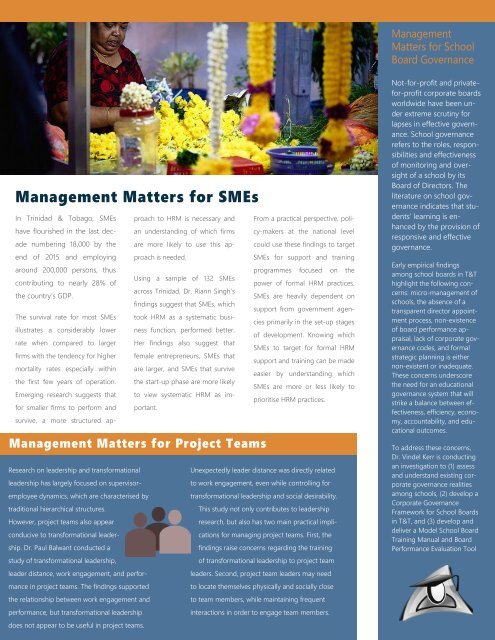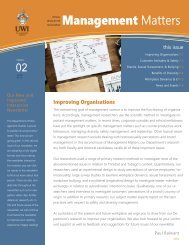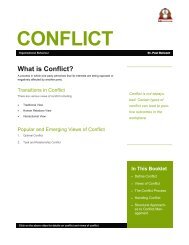DMS Newsletter Draft 2
Create successful ePaper yourself
Turn your PDF publications into a flip-book with our unique Google optimized e-Paper software.
In Trinidad & Tobago, SMEs<br />
have flourished in the last decade<br />
numbering 18,000 by the<br />
end of 2015 and employing<br />
around 200,000 persons, thus<br />
contributing to nearly 28% of<br />
the country’s GDP.<br />
The survival rate for most SMEs<br />
illustrates a considerably lower<br />
rate when compared to larger<br />
firms with the tendency for higher<br />
mortality rates especially within<br />
the first few years of operation.<br />
Emerging research suggests that<br />
for smaller firms to perform and<br />
survive, a more structured approach<br />
to HRM is necessary and<br />
an understanding of which firms<br />
are more likely to use this approach<br />
is needed.<br />
Using a sample of 132 SMEs<br />
across Trinidad, Dr. Riann Singh’s<br />
findings suggest that SMEs, which<br />
took HRM as a systematic business<br />
function, performed better.<br />
Her findings also suggest that<br />
female entrepreneurs, SMEs that<br />
are larger, and SMEs that survive<br />
the start-up phase are more likely<br />
to view systematic HRM as important.<br />
From a practical perspective, policy-makers<br />
at the national level<br />
could use these findings to target<br />
SMEs for support and training<br />
programmes focused on the<br />
power of formal HRM practices.<br />
SMEs are heavily dependent on<br />
support from government agencies<br />
primarily in the set-up stages<br />
of development. Knowing which<br />
SMEs to target for formal HRM<br />
support and training can be made<br />
easier by understanding which<br />
SMEs are more or less likely to<br />
prioritise HRM practices.<br />
Not-for-profit and privatefor-profit<br />
corporate boards<br />
worldwide have been under<br />
extreme scrutiny for<br />
lapses in effective governance.<br />
School governance<br />
refers to the roles, responsibilities<br />
and effectiveness<br />
of monitoring and oversight<br />
of a school by its<br />
Board of Directors. The<br />
literature on school governance<br />
indicates that students’<br />
learning is enhanced<br />
by the provision of<br />
responsive and effective<br />
governance.<br />
Early empirical findings<br />
among school boards in T&T<br />
highlight the following concerns:<br />
micro-management of<br />
schools, the absence of a<br />
transparent director appointment<br />
process, non-existence<br />
of board performance appraisal,<br />
lack of corporate governance<br />
codes, and formal<br />
strategic planning is either<br />
non-existent or inadequate.<br />
These concerns underscore<br />
the need for an educational<br />
governance system that will<br />
strike a balance between effectiveness,<br />
efficiency, economy,<br />
accountability, and educational<br />
outcomes.<br />
Research on leadership and transformational<br />
leadership has largely focused on supervisoremployee<br />
dynamics, which are characterised by<br />
traditional hierarchical structures.<br />
However, project teams also appear<br />
conducive to transformational leadership.<br />
Dr. Paul Balwant conducted a<br />
study of transformational leadership,<br />
leader distance, work engagement, and performance<br />
in project teams. The findings supported<br />
the relationship between work engagement and<br />
performance, but transformational leadership<br />
does not appear to be useful in project teams.<br />
Unexpectedly leader distance was directly related<br />
to work engagement, even while controlling for<br />
transformational leadership and social desirability.<br />
This study not only contributes to leadership<br />
research, but also has two main practical implications<br />
for managing project teams. First, the<br />
findings raise concerns regarding the training<br />
of transformational leadership to project team<br />
leaders. Second, project team leaders may need<br />
to locate themselves physically and socially close<br />
to team members, while maintaining frequent<br />
interactions in order to engage team members.<br />
To address these concerns,<br />
Dr. Vindel Kerr is conducting<br />
an investigation to (1) assess<br />
and understand existing corporate<br />
governance realities<br />
among schools, (2) develop a<br />
Corporate Governance<br />
Framework for School Boards<br />
in T&T, and (3) develop and<br />
deliver a Model School Board<br />
Training Manual and Board<br />
Performance Evaluation Tool




